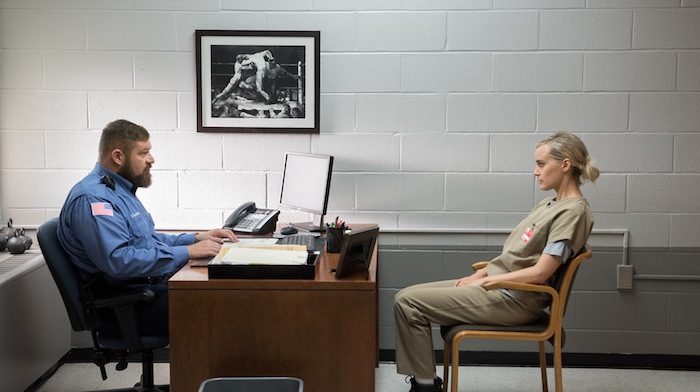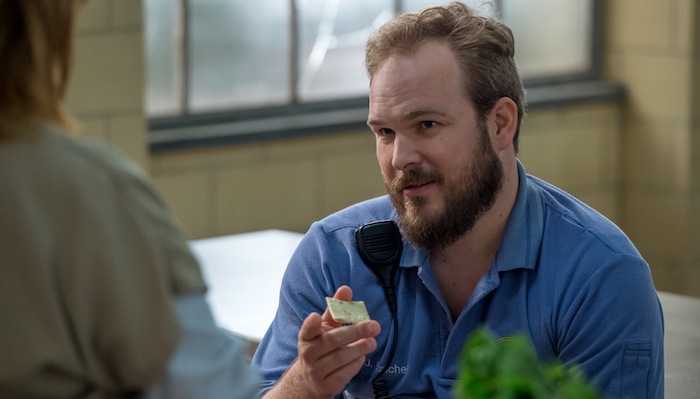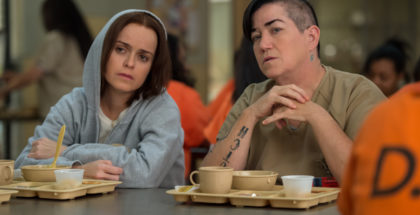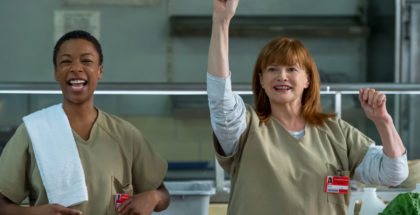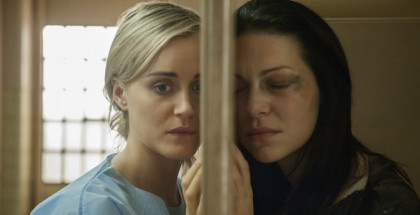Netflix UK binge-review: Orange Is the New Black Season 4, Episode 5 and 6
Review Overview
Heartwarming reunions
10Heartbreaking farewells
10David Farnor | On 25, Jun 2016
Watch Season 4 of Orange Is the New Black along with us: leave your comments below for Episodes 5 and 6, all spoilers welcome. Not caught up with Season 4? Read our spoiler-free review of the first four episodes here. (Warning: The below contains spoilers.)
Season 4 of Orange Is the New Black has been a frequently funny affair so far, from Piper playing gangsta to Taystee playing secretary. But the show’s strength lies in having moods as diverse as its cast – its scale goes all the way from a minimum of many laughs to maximum heartbreak. If you thought this fourth run was going to stay a relatively light affair, Episodes 5 and 6 are a powerful demonstration that this isn’t the case, providing a tragic reunion with two old friends that will have you sobbing on at least one occasion.
Things seem cheerful at first, as Piper swans about with her henchwoman and Soso and Poussey remain starry-eyed over each other. Poussey has even graduated to being Judy King’s perpetually grinning sidekick in her cookery classes. But things start to turn sour, ever so subtly. The underlying culture clash that’s been brought about by the overcrowding of the prison lingers even in the most innocuous of conversations, as we see Cindy and Abdullah (Amanda Stephen) verbally sparring every chance they get, neither of them entitled to the moral high ground. But while Taystee’s hacking of Caputo’s computer – working out that the drone is there to take pap pics of Judy King behind bars – leads to Cindy and Abdullah making amends through the shared enthusiasm for a new business opportunity, everyone else’s friendships, old or new, are moving in the opposite direction.
Chapman, increasingly isolated in her panty kingpin tower, gets more and more paranoid about Ruiz’s plans, so attempts to befriend Piscatella. He’s as prejudiced as they come, all too happy to buy into her snitching on the gang behaviour among Ruiz’s cronies, although he stops short of actually being mates. He does, however, approve the formation of an anti-gang group to patrol the prison. Then, just as Piper thinks she’s got some friendly faces around her, things spiral out of control into a borderline racist movement. Taylor Schilling’s crestfallen face as they chant in unison is marvellous.
Caputo and Linda’s relationship is likewise a treat to witness, as they seem to get closer and closer – in a show full of such a brilliant variety of women, it’s testament to Nick Sandow’s charisma that Caputo more than holds his own on the other side of the bars. Heck, even the prisoners cheer his name, when he promises to introduce new classes to help keep them occupied.
OITNB excels at exploring the practicalities of prisons at all levels, so it’s a surprise, but welcome, detour that takes us to a prison conference, where things such as laser guns are put on display for corporations in the jail game. It’s telling that Caputo looks on the parade in terms of how it can benefit the women under his protection – the opposite of Beth Dover’s Linda, who is firmly focused on the financial bottom line. Their shared enthusiasm for their job seems to make them a good match, but Dover’s composed exterior contrasts with Sandow’s rough edges, making it clearer as time goes on that they’re not going to last – especially when Danny crashes her presentation to protest against the treatment of Litchfield’s ladies and Caputo effectively defends him.
Back in the prison, we also spend a lot more time with Luschek (Matt Peters), as he clocks in and clocks out and attempts not to care about anything at all. Peters has been a likeable presence before now, comfortably playing the slobby comic relief, but he gets the chance to expand into proper asshole territory here, too busy playing FIFA to treat a medical injury and too lazy to check his mail. His friendship with Judy therefore remains an unexpected pleasure, as she seems to enjoy getting one up on him – despite the fact that he’s effectively useless and powerless. But it turns out, in one unsettling moment, that she’s looking to literally get one up on him, doing him a favour and expecting a sexual one in return.
Her favour? That lies with the identity of the letters Luschek doesn’t answer: hate mail that we discover comes from maximum security, where Nicky is currently locked up. (“I hope you choke on Caputo’s dingleberries” is a hilarious highlight.) Natasha Lyonne’s return was hardly a well-kept secret, but it’s an inspired decision: she really came into her own over Orange’s first three seasons, growing from That Person In American Pie With The Awesome Hair to an actor with heart-wrenching nuance and range.
Her introduction is at once bittersweet, as she claims a token for being sober at AA – only to have it confiscated by the guards at the end of the group meeting. That tone continues for the rest of the episode, as Luschek (at Judy’s behest) goes to visit Nicky, as a civilian, to apologise for her being transferred to max. Lyonne doesn’t hold back, screaming down the phone at him with an astonishing amount of rage and passion; you feel for her, even though you know that she’s not entirely innocent (she was as guilty of handling the drugs as he was).
Lyonne, meanwhile, is our way back to another former cellmate: Burset. Laverne Cox, who stole an earlier episode with a similarly brief eruption of anger, is even more powerful when given more screen-time. Usually so elegantly presented, just the sight of her dishevelled, slumped body is horribly moving.
Nicky being sent to clean the corridors of SHU sees the pair collide and Lyonne and Cox do incredible work with barely more than a few words and some glances through a hole in a wall. Neither are in a good place, something that Nicky finds out all too bluntly, when, only a few scenes later, she’s asked to clean the bloody walls and floor of Burset’s empty cell – the show’s decision not to show what we presume to have happened only makes Cox’s sudden absence even more devastating. (If you didn’t cry at the pair’s relieved reunion and Nicky passing Sophia a smuggled magazine, you’ll be in bits by this point.)
That’s enough to send Nicky on a downward, relapsing spiral. Like Sophia’s departure (and her time in the SHU), we’re not shown Nicky’s climb back to sobriety, but that only makes the difference between her Season 3 and Season 4 self more striking – and her slide back to her old ways all the more tragic. There is tension in these episodes, in the form of Maritza Ramos’ (Diane Guerrero) attempts to sneak out panties under the guard’s noses – Can we have a spin-off series just about Ramos’ con artist days please? Preferably as a companion to Suzanne and Morello: Poo Detectives – and Piscatella’s spot-checks on undies in the hallways, but it’s Nicky and Sophia who elevate this gripping double-bill to some of the best episodes in the show’s history – a perfect demonstration of how an ensemble show can still craft individual, character-driven moments. The direction and editing of Episode 6 paces it just right, with the camera picking up on a repeated motif of doors closing (King’s cell door concealing Luschek’s payback and the stairwell door hiding Nicky’s shamed cowing to a guard to get a fix) to gently reinforce the feeling of being trapped with no other options left, even as Judy secures Nicky’s transfer back to minimum security. All that and dingleberries? Orange Is the New Black Season 4 is on fire right now.
Orange Is the New Black Season 4 is available on Netflix UK, as part of an £9.99 monthly subscription.
What did you make of Episodes 5 and 6 of Season 4?


